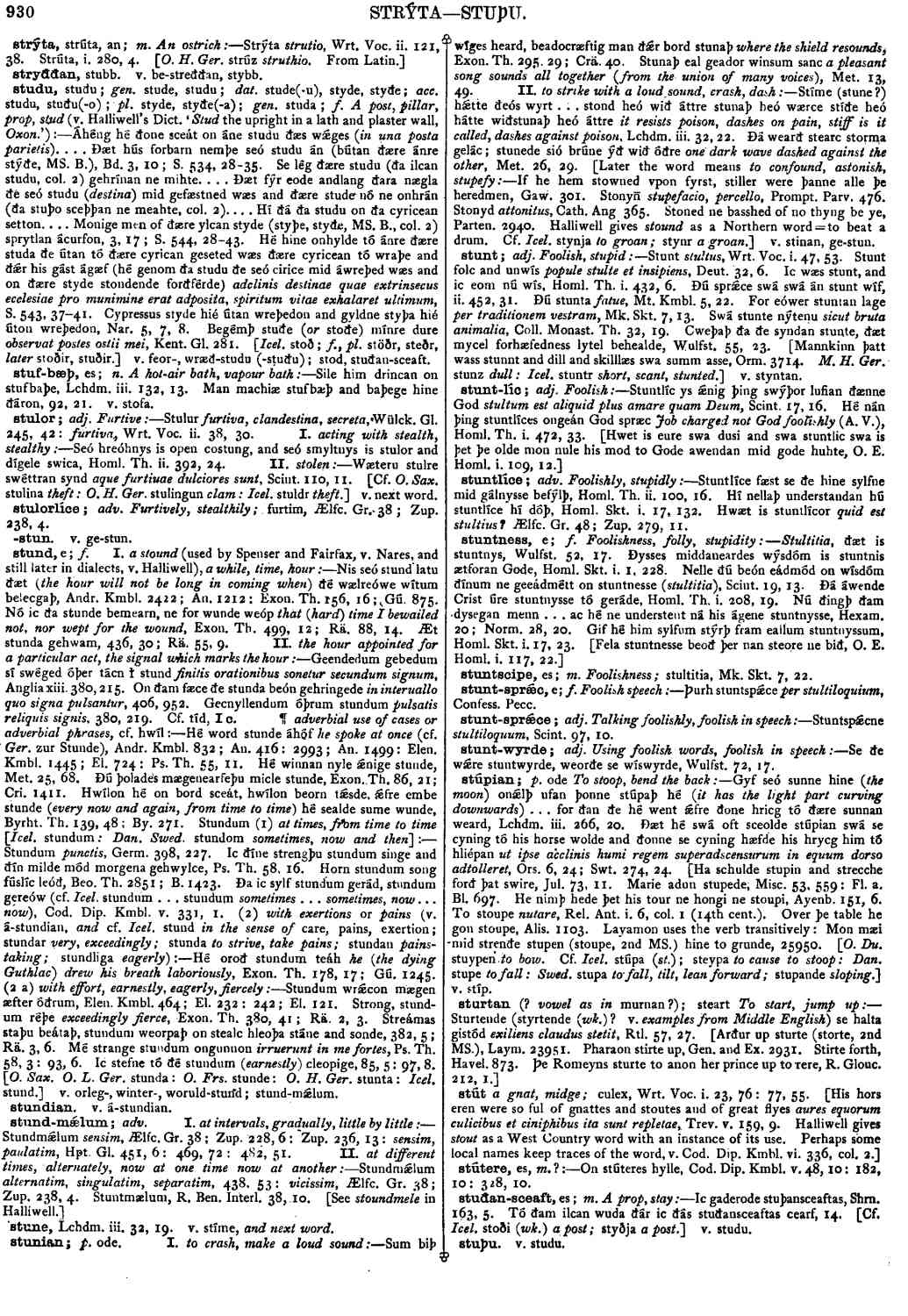stund
- noun [ feminine ]
-
Nis seó stund latu ðæt (
the hour will not be long in coming when
) ðé wælreówe wítum belecgaþ,- Andr. Kmbl. 2422; An. 1212: Exon. Th. 156, 16; Gú. 875.
-
Nó ic ða stunde bemearn, ne for wunde weóp
that (hard) time I bewailed not, nor wept for the wound,
- Exon. Th. 499, 12; Rä. 88, 14.
-
Æt stunda gehwam,
- 436, 30; Rä. 55, 9.
-
Geendedum gebedum sí swéged óþer tácn ł stund
finitis orationibus sonetur secundum signum,
Anglia xiii.- 380, 215.
-
On ðam fæce ðe stunda beón gehringede
in interuallo quo signa pulsantur,
- 406, 952.
-
Gecnyllendum óþrum stundum
pulsatis reliquis signis,
- 380, 219.
-
Cf. tíd, I c. ¶ adverbial use of cases or adverbial phrases, cf. hwíl :-- Hé word stunde áhóf he spoke at once (cf.
Ger.
zur Stunde),- Andr. Kmbl. 832; An. 416: 2993; An. 1499: Elen. Kmbl. 1445; El. 724: Ps. Th. 55, 11.
-
Hé winnan nyle ǽnige stunde,
- Met. 25, 68.
-
Ðú þolades mægenearfeþu micle stunde,
- Exon. Th. 86, 21; Cri. 1411.
-
Hwílon hé on bord sceát, hwílon beorn tǽsde, ǽfre embe stunde (
every now and again, from time to time
) hé sealde sume wunde,- Byrht. Th. 139, 48; By. 271.
- Stundum
-
Stundum
punctis,
- Germ. 398, 227.
-
Ic ðíne strengþu stundum singe and ðín milde mód morgena gehwylce,
- Ps. Th. 58, 16.
-
Horn stundum song fúslíc leóð,
- Beo. Th. 2851; B. 1423.
-
Ða ic sylf stundum gerád, stundum gereów (cf.
Icel. stundum . . . stundum sometimes . . . sometimes, now. . . now ),
- Cod. Dip. Kmbl. v. 331, 1.
-
Hé oroð stundum teáh he (the dying Guthlac) drew his breath laboriously, Exon. Th. 178, 17; Gú. 1245. (2 a)
with effort, earnestly, eagerly, fiercely
:-- Stundum wrǽcon mægen æfter óðrum,- Elen. Kmbl. 464; El. 232: 242; El. 121.
-
Strong, stundum réþe
exceedingly fierce,
- Exon. Th. 380, 41; Rä. 2, 3.
-
Streámas staþu beátaþ, stundum weorpaþ on stealc hleoþa stáne and sonde,
- 382, 5; Rä. 3, 6.
-
Mé strange stundum ongunnon
irruerunt in me fortes,
- Ps. Th. 58, 3: 93, 6.
-
Ic stefne tó ðé stundum (
earnestly
) cleopige,- 85, 5: 97, 8.
Bosworth, Joseph. “stund.” In An Anglo-Saxon Dictionary Online, edited by Thomas Northcote Toller, Christ Sean, and Ondřej Tichy. Prague: Faculty of Arts, Charles University, 2014. https://bosworthtoller.com/29220.
Checked: 0